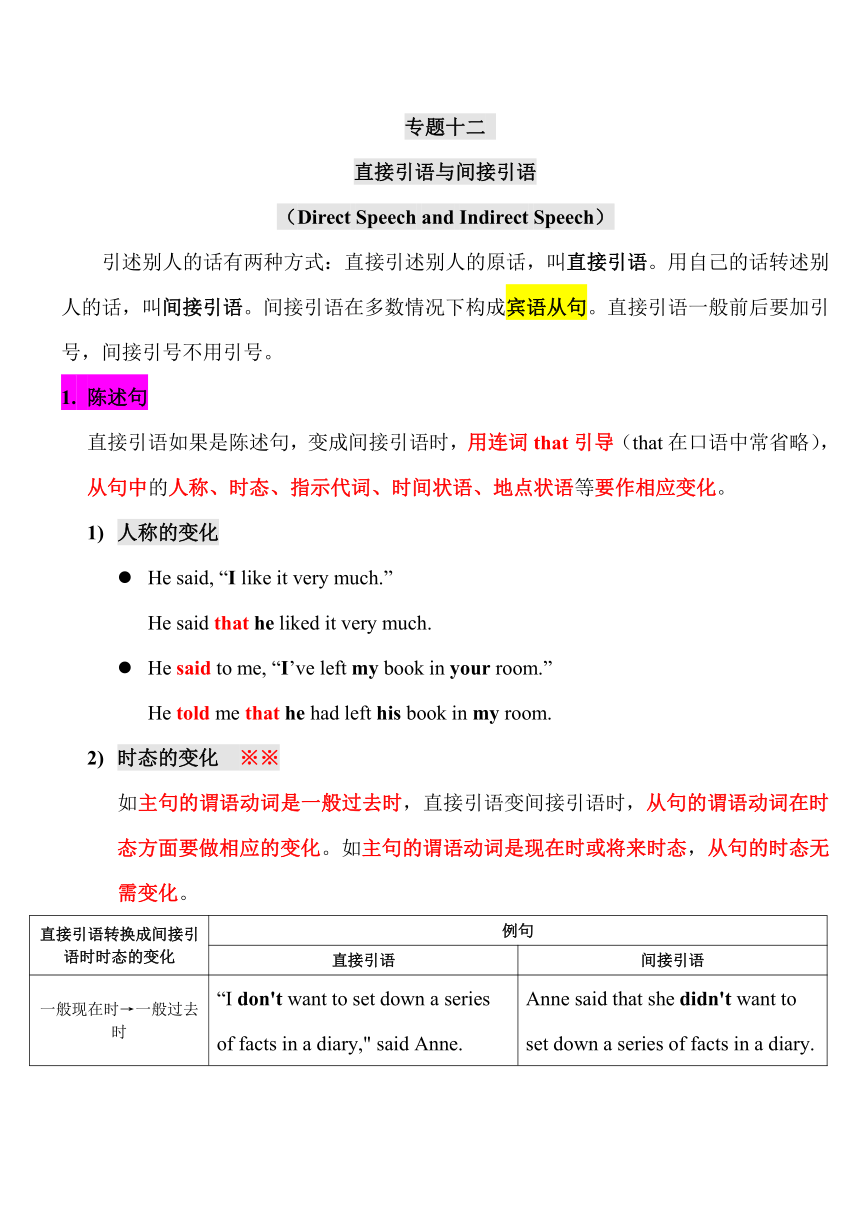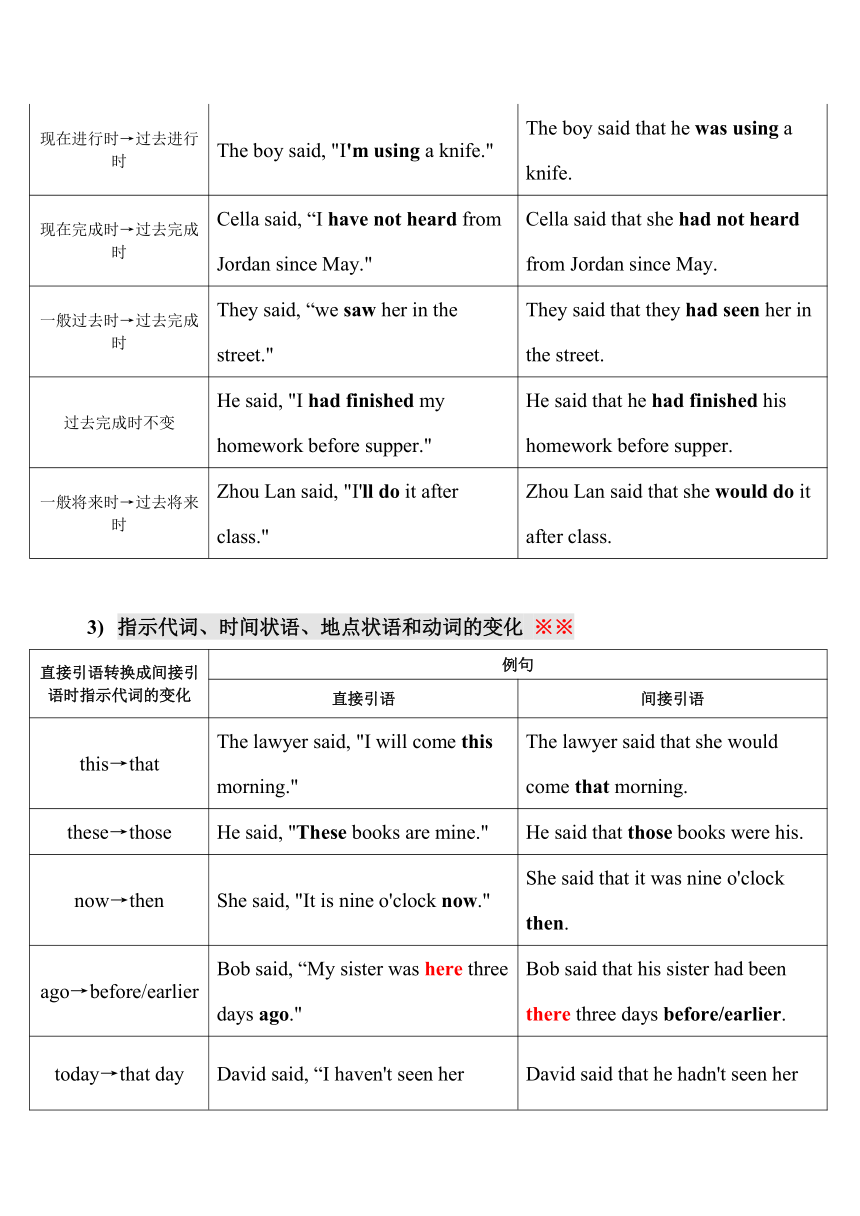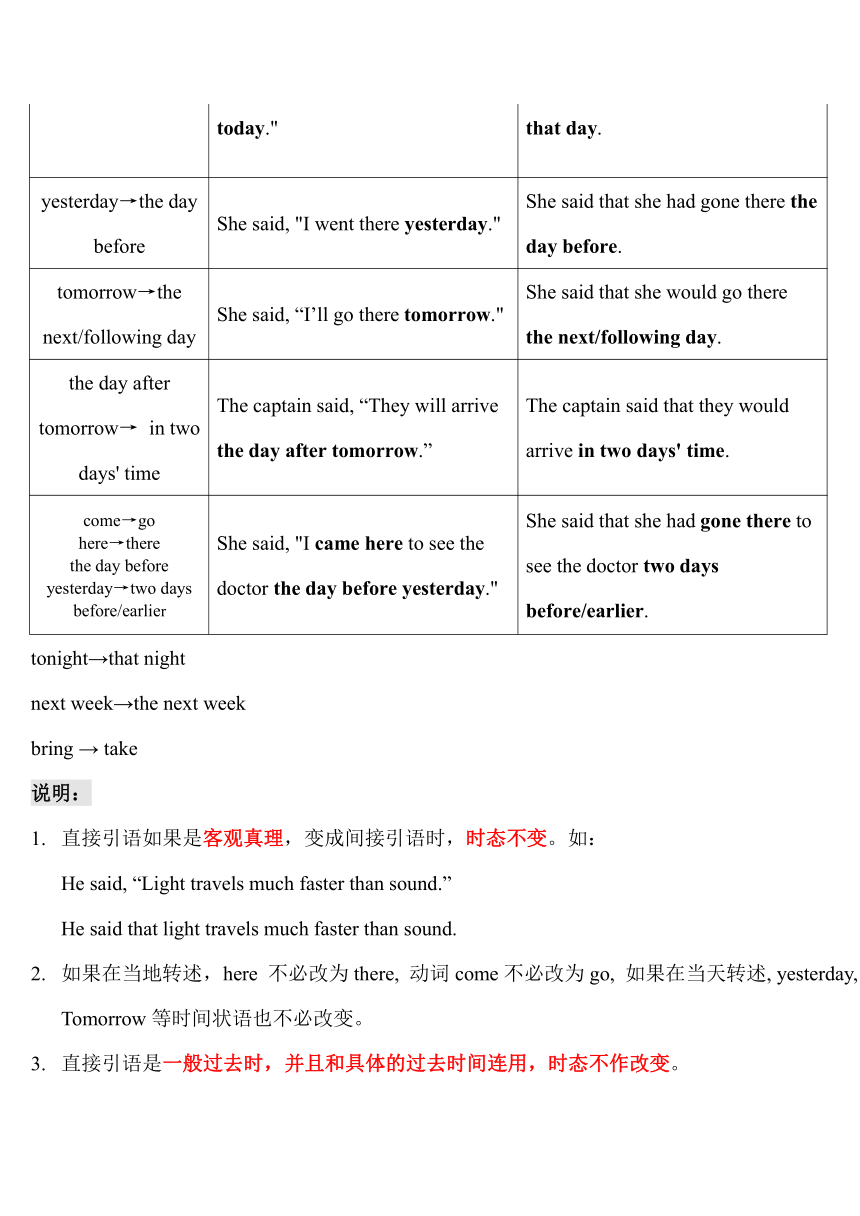2024年人教版中考英语复习专题十二 直接引语与间接引语讲义
文档属性
| 名称 | 2024年人教版中考英语复习专题十二 直接引语与间接引语讲义 |  | |
| 格式 | docx | ||
| 文件大小 | 26.3KB | ||
| 资源类型 | 教案 | ||
| 版本资源 | 通用版 | ||
| 科目 | 英语 | ||
| 更新时间 | 2024-02-21 14:35:14 | ||
图片预览



文档简介
专题十二
直接引语与间接引语
(Direct Speech and Indirect Speech)
引述别人的话有两种方式:直接引述别人的原话,叫直接引语。用自己的话转述别人的话,叫间接引语。间接引语在多数情况下构成宾语从句。直接引语一般前后要加引号,间接引号不用引号。
陈述句
直接引语如果是陈述句,变成间接引语时,用连词that引导(that在口语中常省略),从句中的人称、时态、指示代词、时间状语、地点状语等要作相应变化。
人称的变化
He said, “I like it very much.”
He said that he liked it very much.
He said to me, “I’ve left my book in your room.”
He told me that he had left his book in my room.
时态的变化 ※※
如主句的谓语动词是一般过去时,直接引语变间接引语时,从句的谓语动词在时态方面要做相应的变化。如主句的谓语动词是现在时或将来时态,从句的时态无需变化。
直接引语转换成间接引语时时态的变化 例句
直接引语 间接引语
一般现在时→一般过去时 “I don't want to set down a series of facts in a diary," said Anne. Anne said that she didn't want to set down a series of facts in a diary.
现在进行时→过去进行时 The boy said, "I'm using a knife." The boy said that he was using a knife.
现在完成时→过去完成时 Cella said, “I have not heard from Jordan since May." Cella said that she had not heard from Jordan since May.
一般过去时→过去完成时 They said, “we saw her in the street." They said that they had seen her in the street.
过去完成时不变 He said, "I had finished my homework before supper." He said that he had finished his homework before supper.
一般将来时→过去将来时 Zhou Lan said, "I'll do it after class." Zhou Lan said that she would do it after class.
指示代词、时间状语、地点状语和动词的变化 ※※
直接引语转换成间接引语时指示代词的变化 例句
直接引语 间接引语
this→that The lawyer said, "I will come this morning." The lawyer said that she would come that morning.
these→those He said, "These books are mine." He said that those books were his.
now→then She said, "It is nine o'clock now." She said that it was nine o'clock then.
ago→before/earlier Bob said, “My sister was here three days ago." Bob said that his sister had been there three days before/earlier.
today→that day David said, “I haven't seen her today." David said that he hadn't seen her that day.
yesterday→the day before She said, "I went there yesterday." She said that she had gone there the day before.
tomorrow→the next/following day She said, “I’ll go there tomorrow." She said that she would go there the next/following day.
the day after tomorrow→ in two days' time The captain said, “They will arrive the day after tomorrow.” The captain said that they would arrive in two days' time.
come→go here→there the day before yesterday→two days before/earlier She said, "I came here to see the doctor the day before yesterday." She said that she had gone there to see the doctor two days before/earlier.
tonight→that night
next week→the next week
bring → take
说明:
直接引语如果是客观真理,变成间接引语时,时态不变。如:
He said, “Light travels much faster than sound.”
He said that light travels much faster than sound.
如果在当地转述,here 不必改为there, 动词come不必改为go, 如果在当天转述, yesterday,
Tomorrow等时间状语也不必改变。
直接引语是一般过去时,并且和具体的过去时间连用,时态不作改变。
She said, “I was born in 1995.” → She said that she was born in 1995.
祈使句
转述祈使句时,要将祈使句的动词原形变成为带to的不定式,并在不定式的前面根据句子的意思加上tell, ask, order等动词,如果祈使句为否定式,在不定式的前面加not。例如:
The hostess said to us, “Please sit down.”
The hostess asked us to sit down.
Father said to him, “Go away!”
Father ordered him to go away.
Mother said to me, “Come back before 10:00.”
Mother told me to go back before 10:00.
He said, “Don’t make so much noise, boys.”
He told the boys not to make so much noise.
若是以let’s开头的祈使句,则通常变为suggest doing 或“suggest+从句”的形式。
疑问句
直接引语如果是疑问句,变成间接引语时,要把疑问句语序变成陈述句语序(主语在谓语的前面)(※※),句末用句号,主语的人称、时态和状语等也要作相应的变化。
一般疑问句:
直接引语如果是一般疑问句,变成间接引语时,谓语动词是say或said时,要改为ask或asked,原问句变成由连词whether(或if)引导的宾语从句。没有间接宾语的,可以根据情况加上。例如:
“Do you think a diary can become your friend ” the writer says.
The writer asks us if we think a diary can become our friend.
He said, “Are you interested in English ”
He asked (me) if I was interested in English.
She said, “Did you see him last night ”
She asked (me) whether I had seen him the night before.
特殊疑问句:
直接引语如果是特殊疑问句,变成间接引语时,仍用原来的疑问词引导。例如:
特殊疑问词+陈述句语序(主+谓)
“What do you want ” he asked me.
He asked me what I wanted.
“What do you call your diary ” Anne’s sister asked her.
Anne’s sister asked her what she called her diary.
“When did you go to bed last night ” Father said to Anne.
Father asked Anne when she went to bed the night before.
练习
将所给直接引语变为间接引语,每空一词:
1. “I never eat meat.” he said.
He said that ______ never ______ meat.
2. “I’ve found my wallet.” he said to me.
He ______ me that he ______ ______ ______ wallet.
3. “I took it home with me.” she said.
She said that ______ ______ _______ it home with her.
4. The teacher said, “The sun rises in the east and goes down in the west.”
The teacher said that the sun ______ in the east and ______ down in the west.
5. “I met her yesterday.” he said to me.
He ______ me that he ______ met the day ______.
6. “You must come here before five.” he said.
He said that I ______ to go ______ before five.
7. “I bought the house 10 years ago.” he said.
He said that he _______ bought the house 10 years _______.
8. “Did you see her last week ” he said.
He ______ ______ I had seen her the week _______.
9. He said, “You can sit here, Jim.”
He ______ Jim that he ______ sit there
10. He asked, “How did you find it, mother ”
He asked her mother ______ ______ ______ found it.
11. “Where have you been these days ” he asked.
He asked me _______ _______ _______been _______ days.
12. “Do you know where she lives ” he asked.
He asked ______ ______ knew where she ______.
13. “Stop making so much noise, children.” he said.
He ______ the children ______ ______ making so much noise.
14. “Don’t tell him the news.” she said.
She told me _______ ______ ______ him the news.
15. “Are you intested in this ” he said.
He ______ ______ I was interestd in ______.
直接引语与间接引语
(Direct Speech and Indirect Speech)
引述别人的话有两种方式:直接引述别人的原话,叫直接引语。用自己的话转述别人的话,叫间接引语。间接引语在多数情况下构成宾语从句。直接引语一般前后要加引号,间接引号不用引号。
陈述句
直接引语如果是陈述句,变成间接引语时,用连词that引导(that在口语中常省略),从句中的人称、时态、指示代词、时间状语、地点状语等要作相应变化。
人称的变化
He said, “I like it very much.”
He said that he liked it very much.
He said to me, “I’ve left my book in your room.”
He told me that he had left his book in my room.
时态的变化 ※※
如主句的谓语动词是一般过去时,直接引语变间接引语时,从句的谓语动词在时态方面要做相应的变化。如主句的谓语动词是现在时或将来时态,从句的时态无需变化。
直接引语转换成间接引语时时态的变化 例句
直接引语 间接引语
一般现在时→一般过去时 “I don't want to set down a series of facts in a diary," said Anne. Anne said that she didn't want to set down a series of facts in a diary.
现在进行时→过去进行时 The boy said, "I'm using a knife." The boy said that he was using a knife.
现在完成时→过去完成时 Cella said, “I have not heard from Jordan since May." Cella said that she had not heard from Jordan since May.
一般过去时→过去完成时 They said, “we saw her in the street." They said that they had seen her in the street.
过去完成时不变 He said, "I had finished my homework before supper." He said that he had finished his homework before supper.
一般将来时→过去将来时 Zhou Lan said, "I'll do it after class." Zhou Lan said that she would do it after class.
指示代词、时间状语、地点状语和动词的变化 ※※
直接引语转换成间接引语时指示代词的变化 例句
直接引语 间接引语
this→that The lawyer said, "I will come this morning." The lawyer said that she would come that morning.
these→those He said, "These books are mine." He said that those books were his.
now→then She said, "It is nine o'clock now." She said that it was nine o'clock then.
ago→before/earlier Bob said, “My sister was here three days ago." Bob said that his sister had been there three days before/earlier.
today→that day David said, “I haven't seen her today." David said that he hadn't seen her that day.
yesterday→the day before She said, "I went there yesterday." She said that she had gone there the day before.
tomorrow→the next/following day She said, “I’ll go there tomorrow." She said that she would go there the next/following day.
the day after tomorrow→ in two days' time The captain said, “They will arrive the day after tomorrow.” The captain said that they would arrive in two days' time.
come→go here→there the day before yesterday→two days before/earlier She said, "I came here to see the doctor the day before yesterday." She said that she had gone there to see the doctor two days before/earlier.
tonight→that night
next week→the next week
bring → take
说明:
直接引语如果是客观真理,变成间接引语时,时态不变。如:
He said, “Light travels much faster than sound.”
He said that light travels much faster than sound.
如果在当地转述,here 不必改为there, 动词come不必改为go, 如果在当天转述, yesterday,
Tomorrow等时间状语也不必改变。
直接引语是一般过去时,并且和具体的过去时间连用,时态不作改变。
She said, “I was born in 1995.” → She said that she was born in 1995.
祈使句
转述祈使句时,要将祈使句的动词原形变成为带to的不定式,并在不定式的前面根据句子的意思加上tell, ask, order等动词,如果祈使句为否定式,在不定式的前面加not。例如:
The hostess said to us, “Please sit down.”
The hostess asked us to sit down.
Father said to him, “Go away!”
Father ordered him to go away.
Mother said to me, “Come back before 10:00.”
Mother told me to go back before 10:00.
He said, “Don’t make so much noise, boys.”
He told the boys not to make so much noise.
若是以let’s开头的祈使句,则通常变为suggest doing 或“suggest+从句”的形式。
疑问句
直接引语如果是疑问句,变成间接引语时,要把疑问句语序变成陈述句语序(主语在谓语的前面)(※※),句末用句号,主语的人称、时态和状语等也要作相应的变化。
一般疑问句:
直接引语如果是一般疑问句,变成间接引语时,谓语动词是say或said时,要改为ask或asked,原问句变成由连词whether(或if)引导的宾语从句。没有间接宾语的,可以根据情况加上。例如:
“Do you think a diary can become your friend ” the writer says.
The writer asks us if we think a diary can become our friend.
He said, “Are you interested in English ”
He asked (me) if I was interested in English.
She said, “Did you see him last night ”
She asked (me) whether I had seen him the night before.
特殊疑问句:
直接引语如果是特殊疑问句,变成间接引语时,仍用原来的疑问词引导。例如:
特殊疑问词+陈述句语序(主+谓)
“What do you want ” he asked me.
He asked me what I wanted.
“What do you call your diary ” Anne’s sister asked her.
Anne’s sister asked her what she called her diary.
“When did you go to bed last night ” Father said to Anne.
Father asked Anne when she went to bed the night before.
练习
将所给直接引语变为间接引语,每空一词:
1. “I never eat meat.” he said.
He said that ______ never ______ meat.
2. “I’ve found my wallet.” he said to me.
He ______ me that he ______ ______ ______ wallet.
3. “I took it home with me.” she said.
She said that ______ ______ _______ it home with her.
4. The teacher said, “The sun rises in the east and goes down in the west.”
The teacher said that the sun ______ in the east and ______ down in the west.
5. “I met her yesterday.” he said to me.
He ______ me that he ______ met the day ______.
6. “You must come here before five.” he said.
He said that I ______ to go ______ before five.
7. “I bought the house 10 years ago.” he said.
He said that he _______ bought the house 10 years _______.
8. “Did you see her last week ” he said.
He ______ ______ I had seen her the week _______.
9. He said, “You can sit here, Jim.”
He ______ Jim that he ______ sit there
10. He asked, “How did you find it, mother ”
He asked her mother ______ ______ ______ found it.
11. “Where have you been these days ” he asked.
He asked me _______ _______ _______been _______ days.
12. “Do you know where she lives ” he asked.
He asked ______ ______ knew where she ______.
13. “Stop making so much noise, children.” he said.
He ______ the children ______ ______ making so much noise.
14. “Don’t tell him the news.” she said.
She told me _______ ______ ______ him the news.
15. “Are you intested in this ” he said.
He ______ ______ I was interestd in ______.
同课章节目录
